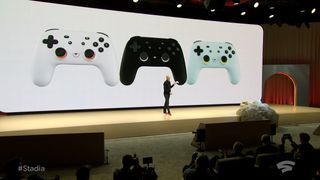At its GDC 2019 keynote today, Google announced Stadia, a cloud streaming service that claims to make graphically-intensive games available to anyone who can run Chrome. It'll launch this year, and Doom Eternal will be one of the first games on the platform, streaming at 4K resolution, 60 fps.
Games should be "instantly enjoyable, with access for everyone," said Google CEO Sundar Pichai.
Streaming services like Nvidia's or Google's render your games on a remote server rather than on your local machine, and then stream the video to you while sending your input to the server. This obviously creates latency concerns, and no one has yet created a cloud streaming service that's as consistently good as we'd like. After having given up physical media ownership, asking us to give up even storing and running game files locally is a tall order, so Google has some convincing to do.
Stadia is built on an infrastructure no one else has.Stadia head of engineering Majd Bakar
Stadia head of engineering Majd Bakar said that Google's advantage is its data center network: "fiber optic links and subsea cables between hundreds of points of presence and more than 7,500 edge node locations around the globe, all connected with our network backbone."
"Stadia is built on an infrastructure no one else has," he added.
On the rendering side, Google's data centers will be powerful. The company says it partnered with AMD to design a custom GPU with "more than ten teraflops of power," which Google has paired with a custom CPU for each Stadia rendering instance. Those instances will run on Linux and use the Vulkan API, and Google has partnered with Unreal and Unity to "bring full support to the most popular and familiar game engines to our development community."
Aside from rendering power beyond what any average player's PC can muster, streaming makes some other new things possible for developers. Lead Stadia R&D designer Erin Hoffman-John points out that split-screen local multiplayer games normally have to render two scenes at the same time, which restricts the resources available for each view. With Stadia, a split-screen game could instead render both player's views on different Stadia instances.
Stadia will also allow players to share game states—save files, basically—should the developer build in the option, and Q-Games' Dylan Cuthbert announced that he's designing a game around the concept of building 'sharable moments' via game states.

There's no Google-produced console to go with Stadia—at launch, it will be available on "desktops, laptops, TVs, tablets, and phones." On stage, Google VP and GM Phil Harrison demonstrated near-instantly going from viewing an Assassin's Creed trailer on YouTube to playing the game, as well as rapidly switching between devices. Since all the rendering is happening on a server, it's just a matter of loading up a stream.
While Stadia will be usable with existing USB devices—controllers, keyboards, mice—Google also announced a new controller with a button for sharing gameplay to YouTube. Integration with YouTube will also allow players to queue up to join livestreamers as they play.
On top of all this, Google also announced a first-party game studio headed by Jade Raymond. We'll have more on Stadia and what Google's up to throughout the week.

0 comments:
Post a Comment